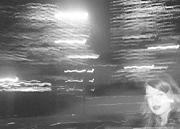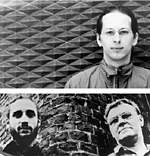“IF PEOPLE DON’T want to get emotionally involved in something, then it’s definitely not the show to see,” admits Shannon Wright of her dramatic, gripping performances. “You can’t just go in there and have a beer and have a conversation with your friend. You can, but you’ll be interrupted.”
Shannon Wright
Paradox Theater, Friday, July 7
Her remarks come about an hour after she’s staged such a show, opening for Peter Case in front of a scant crowd at New York’s Mercury Lounge. With her two long auburn pigtails flailing, Wright brings to mind an overgrown Pippy Longstocking trying to shake loose a vivid nightmare. She enhances this vibe with a dreamy, slightly jarring stage set: dim red gels on the lights, a photo slide show run on a TV, and a piano that’s attached to a Visualizer, a large backlit board that displays each note as she taps it out. “I like the idea that [my show] can be interesting visually,” she explains. “I don’t even think of me as the thing that people are looking at. The whole club scene is just saturated with so many of the same things. If people are going to pay 10 bucks to come to the show, I should give them something they don’t normally see.”
On this tour, Wright plays about half of the set on her own, alternating between a battered acoustic guitar and the electric piano; on the rest she’s backed by drummer Brian Teasley (also of Man or Astro-Man?). Most of the songs come from her two solo albums, the recent Maps of Tacit and her 1999 debut, Flightsafety (both on Touch and Go). Like her shows, the albums aren’t easy listening. Their allure stems from the friction embedded in each song—sweet breathy tunes colliding with enraged wails or furious guitar strums. Like Kristin Hersh, Polly Harvey, or Chan Marshall of Cat Power, Wright tempers her voice to suit her evocative, though rarely literal, lyrics. “It comes from just trying to [capture] that really raw emotion human beings have, and doing it in a two-minute-and-30-second song,” notes Wright. “I can’t just write everything that is beautiful in the world, because it’s not all that way. Things are beautiful, things are ugly; things are beautiful, things are ugly. And that’s how it is, the reality of life.”
A few years ago, Wright’s adherence to truthful songwriting led to the collapse of her previous band, Crowsdell. Her bandmates, she insists, “were starting to dictate what they wanted me to write about, but wouldn’t write it themselves. So I felt really dishonest, even though I didn’t write that way. I always felt like I had to cover up to please them and hide it. That was really frustrating and wearying. It was pretty much the demise of the band.” Afterwards, Wright briefly considered other lines of work, but quickly found herself drawn back in and recorded what would become Flightsafety in a backwoods shack in North Carolina. “I feel really lucky in that way,” she muses, commenting on her emotional connection to music. “I hear other people say things like, ‘Well, this song just doesn’t mean the same to me as when I wrote it,’ and I always feel sort of weird because I don’t feel that way. Sometimes I feel more emotional [onstage] than when I wrote it.”
For Wright, music is a two-headed beast offering both solace and strife. “It was always my outlet. It was my best friend,” she recalls of her growing-up years. “Staying at home, listening to records—it was just part of me. I just want to give back what it gives to me.”*








